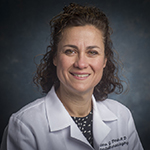In honor of #WomeninMedicine Month, the UAB Department of Surgery is kicking off a new Q&A series to showcase some of our favorite women in surgery.

This week, we’re talking with Sara Pereira, M.D., who serves as an associate professor in the Division of Cardiothoracic Surgery and a co-director for the department’s Pre-College Research Internship for Students from Minority Backgrounds program.
What is something interesting about you that most people don’t know?
Mountain biking has been my hobby and life passion since college, besides my husband, two girls and two Bernedoodles.
What is your leading charge at UAB?
I returned to UAB after 10 years in private practice for two reasons:
- I missed teaching and education and felt compelled to teach our next generation of cardiac surgeons. There is a true shortage of cardiac surgeons in the U.S. now and will continue to be in the upcoming years, and we need to be excellent mentors and role models and to train highly competitive and compassionate physicians and surgeons for the future.
- UAB represents a long tradition of exceptional cardiac surgical care, and I wanted to help lead our program back into one of the top national centers for cardiac surgery.
Why did you decide to go into surgery?
My mother was diagnosed with acute liver failure from autoimmune hepatitis when I was a freshman in college. She received an emergent liver transplant and spent five months in the hospital in San Francisco, California, during my first year of college in Berkeley, California.
As I observed her illness and life-saving transplant at age 48, I was inspired by the good and bad in the medical world. This changed my path from business to pre-med. My first priority and promise to my mother back then was to be that physician who treats every patient as if they were my mother and every family as if they were the young, scared college student I was back in 1988.
I chose cardiac surgery after seeing the heart as a third-year surgery resident. I thought it was the most incredible human organ, and the operations and patient recovery fascinated me back then just as much as they do today, almost 20 years later.
What would you say to other young women who might be considering going into medicine?
Find your passion and follow your dream. Don’t let anybody tell you that you cannot do it.
What are some of the struggles you’ve faced as a woman in medicine?
Competition from my male colleagues in training and career positions early in my career. I always felt that I had to prove myself to my colleagues and to prove that I could be as good or better than male surgeons in my field, where 2-3 percent of cardiac surgeons in the U.S. are female.
If you have a mentor who is also a woman in medicine, do you find it beneficial to have a strong, woman mentor?
My mentors in general and cardiac surgery have always been male. One (Dr. Jim Hurst) was a trauma surgeon in Cincinnati, Ohio. He believed in me and let me take out a spleen on a critical trauma patient as a second-year resident. He gave me the confidence to finish my general surgery training and pursue cardiac surgery in the earlier days when I was the only woman in a very traditional general surgery program.
My second mentor was Dr. Al Pacifico at UAB who was an amazing technical surgeon. He entrusted me to operate and take care of his patients and hired me in 2006 to stay as faculty at UAB. Now as a female academic cardiac surgeon, I think that it is critical for us to instill that desire and confidence in young physicians that they can do anything and any discipline that they desire.